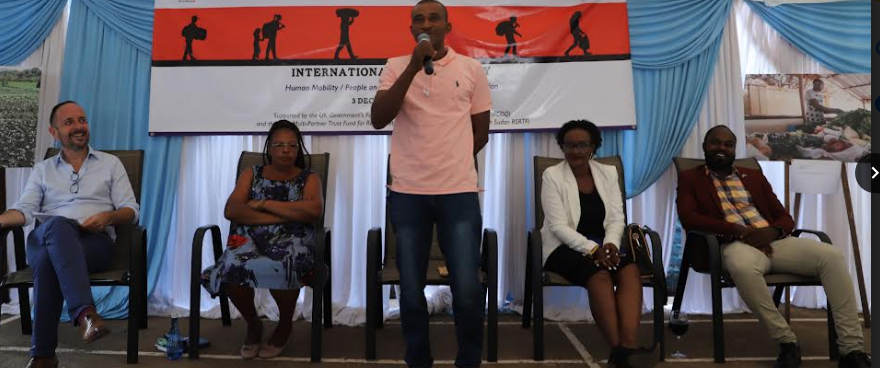The International Organization for Migration (IOM) on Wednesday hosted a panel discussion and a photo exhibition bringing together labor migrants living and working in South Sudan, the international donor community, and heads of UN agencies and embassies ahead of International Migrants Day commemorated annually on 18 December.
The half-day event themed “Human Mobility/People on The Move – Migrants in South Sudan”, aimed to raise awareness on the positive contributions made by migrants towards the socio-economic development of South Sudan’s whilst generating remittances that are useful for their home countries, according to a press statement from IOM.
During the panel discussion moderated by IOM South Sudan’s Chief of Mission, Peter Van der Auweraert, the migrants who represented four countries, namely, Burundi, Kenya, Nigeria, and Rwanda shared personal experiences about reasons they left their countries, life in South Sudan, including challenges they face.
“We do not leave (our countries) because we want to, we leave because of circumstances,” said Regina Muthee, a businesswoman from Kenya. “I came to South Sudan to find new opportunities so that I could make a better life for my four daughters.”
She added: “When I came in 2009, I was employed in a hair salon and a year later, I opened my own. I train women from South Sudan and other countries about the hair and beauty business, and many have gone to open their own businesses.”
According to the press statement, IOM provides technical support and capacity building to member states to enhance labor migration governance as well as protection of migrant workers and their family members.
IOM continues to work with governments including South Sudan, to improve migration management in the region, and in particular, to address Trafficking in Persons (TiP) and Smuggling of Migrants (SoM) from and within the East and Horn of Africa (EHoA) region.
“The policies and frameworks that we are continuously working with governments together to strengthen and promote well-managed migration and reduce migrant vulnerability translate to the stories that we are hearing today,” said IOM South Sudan Chief, Peter Van der Auweraert. “These policies affect real people; they have an opportunity to improve the lives of millions of people in search for new opportunities, some who are forced to escape conflict, persecution or environmental destruction.”
At the event, a photo exhibition featuring portraits of labor migrants working in South Sudan showcased the various sectors migrants work in, giving a window into their daily lives and highlighting their contribution to the economy of South Sudan.
The number of international migrants in South Sudan remains unknown. However, the United Nations Department of Economic and Social Affairs (UN DESA) estimates 865,600 international migrants in South Sudan or about 7.8% of the national population. Of that number, about 48% are female and 52% are male.




